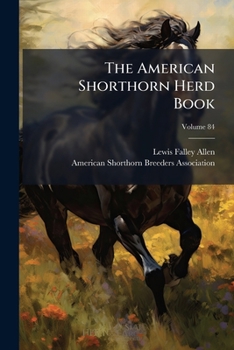The American Shorthorn Herd Book; Volume 84
"The American Shorthorn Herd Book, Volume 84" is a detailed record of the American Shorthorn breed, a type of cattle known for its versatility and economic value. Compiled by Lewis Falley Allen and the American Shorthorn Breeders Association, this volume serves as an invaluable resource for breeders, agricultural historians, and anyone interested in the lineage and development of this important livestock breed.
This meticulously maintained herd book provides a comprehensive registry of Shorthorn cattle, documenting their ancestry and pedigree. It offers essential information for tracking bloodlines, assessing genetic traits, and making informed breeding decisions. As a historical document, this volume provides insight into the practices and priorities of American cattle breeders during the period it covers, reflecting the evolving landscape of agricultural science and animal husbandry. It stands as a testament to the enduring importance of careful record-keeping in the advancement of agricultural practices and the preservation of valuable genetic resources.
This work has been selected by scholars as being culturally important, and is part of the knowledge base of civilization as we know it. This work was reproduced from the original artifact, and remains as true to the original work as possible. Therefore, you will see the original copyright references, library stamps (as most of these works have been housed in our most important libraries around the world), and other notations in the work.
This work is in the public domain in the United States of America, and possibly other nations. Within the United States, you may freely copy and distribute this work, as no entity (individual or corporate) has a copyright on the body of the work.
As a reproduction of a historical artifact, this work may contain missing or blurred pages, poor pictures, errant marks, etc. Scholars believe, and we concur, that this work is important enough to be preserved, reproduced, and made generally available to the public. We appreciate your support of the preservation process, and thank you for being an important part of keeping this knowledge alive and relevant.





